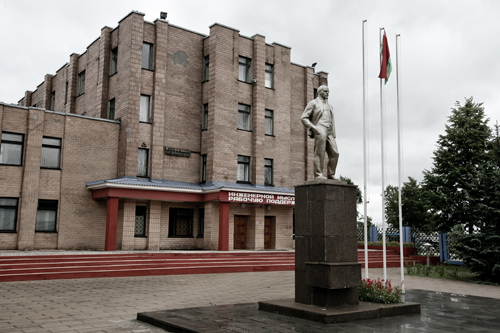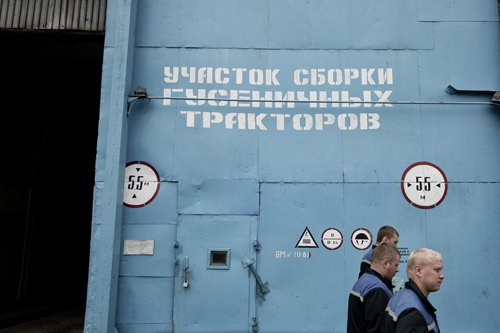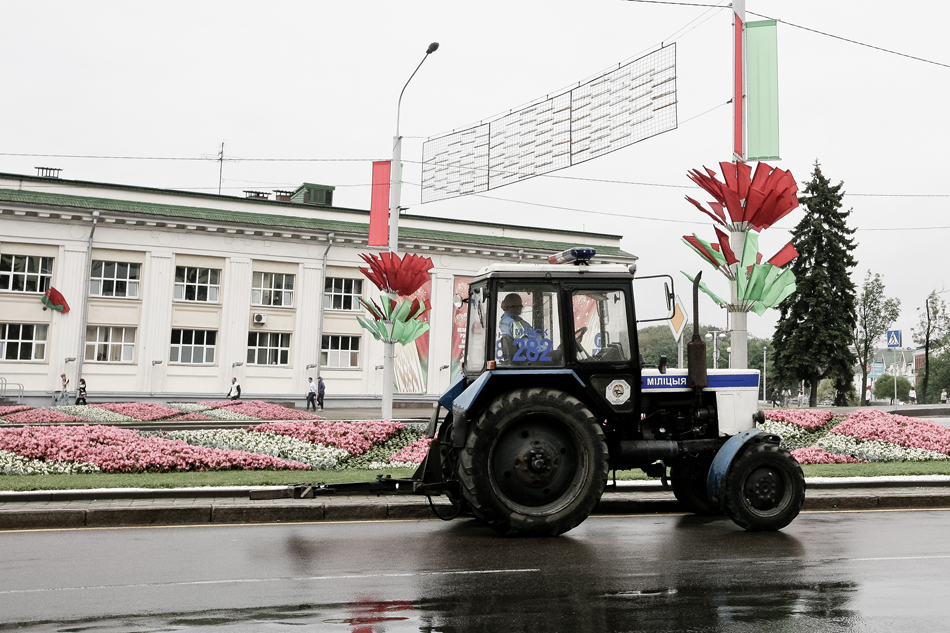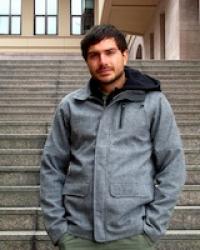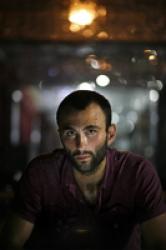From the Soviet Union
they sent us
a Belarus tractor,
a pretty one
with a plow.
—Bulgarian song
One of my earliest memories is riding a Belarus tractor. My grandmother was the mayor of a small village in Communist Bulgaria and, being her favorite grandchild, I seemed to wield enormous power over all municipal employees. To be on good terms with me was a smart career move. Whenever there was road work in and around the village, I was there, riding the paving machine, the dump trucks, and the roller, hungrily breathing in the tar fumes and squealing with joy. When summer came around and the hills of the Danubian Plain turned into a sea of wheat, I was given a privileged spot on a combine harvester. The heat was dreadful and my lungs got congested by dust, but I liked it anyway. My favorite ride, though, was the tractor.
It was a blue machine with large rear wheels and the loudest engine in the world. The driver, uncle Mitko, had a bushy moustache, like Stalin’s, and always wore the same dirty cotton wife-beater. He was a good friend of my grandmother’s and every afternoon he would stop by our house after finishing work at the collective farm. With mayoral permission he would lift me up into the cab and place me on the seat next to him. I could smell the alcohol on his breath, along with the headier mix of diesel, sweat, and earth. I loved that smell. I loved the levers and buttons and dashboard instruments, the steering wheel that looked enormous even in uncle Mitko’s enormous hands. “Welcome to Belarus,” he’d say every time with a mystifying smile, the way I had seen Stalin smile at little children in the old picture books in my grandmother’s library. “This tractor was made in Belarus, in the mighty Soviet Union,” he’d explain. “It’s the best tractor in the world.” Then he’d thrust the stick shift into first gear, the transmission growling, and the next moment the tractor would jolt forward, jostling me into the air. It was the closest thing to flying. From my place in the cab I was the tallest kid in the village, looking at the receding world far below, the people, the angry geese hissing and reluctantly making way for us. My friends wanted to become mountaineers or cosmonauts one day, but I already knew that it was tractor drivers who had the best vantage.
Some years later, the Communist regime in Bulgaria quietly passed away in the autumn of 1989, uncle Mitko died of cancer soon after (his tractor became his hearse, pulling the flatbed trailer on which his coffin was laid), and I failed to become a tractor driver, but for some reason tractors got stuck in the muddy fields of my mind. And not just any kind of tractor. More and more often I’d see the gleaming green John Deere machines, recently imported from the US, plowing and sowing my homeland with the grains of capitalism, and I’d feel a twinge of resentment. What did a deer prancing across the American prairies have to do with me? My first and only love was Belarus, the one with the large rear wheels, assembled at the Minsk Tractor Works in the mighty Soviet Union, the classic MTZ-50. I’d still see them on the roads of Eastern Europe sometimes, hobbling like ghosts in their old age, decrepit and forlorn, their collective farms gone, and I’d feel the impulse to flag one of them down, and cry over its bitter fate. What happened to you, dear Belarus?
At the end of World War II, the Soviet economy and infrastructure was in shambles, with the Byelorussian Soviet Socialist Republic (BSSR) suffering some of the worst damage: a third of its population dead, 209 of its 290 towns demolished, 85 percent of its industry devastated. The few operational factories in the country had been militarized, and farming machines were in severe shortage or were too old and inadequate. Hunger threatened to finish the work of German bombs. Times were so desperate that some decommissioned tanks were stripped of their turrets and armor and used to drag plows in their wake. They proved much too heavy and unwieldy for the job, however, and the need for specialized tillage vehicles became apparent even to Soviet apparatchiks. Following his beloved planned-economy models, Stalin resolved to make BSSR a major center of the Soviet post-war heavy industry, with an emphasis on the manufacturing of agricultural machines and equipment. The Minsk Tractor Works was born in 1946, and the Belarus tractor followed soon after.
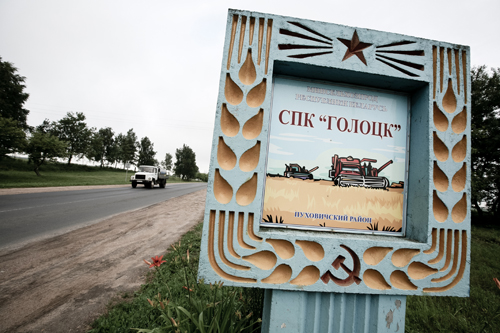
- A Soviet-era roadside poster promoting Agricultural Production Cooperative “Golotsk,” a cooperative farm.
The enterprise was a roaring—and lasting— success. In 1972 the main assembly line in Minsk rolled out its millionth tractor, and by 1984 the figure was already double that, with its MTZ-80 becoming the most abundant model in the world. Using the cushy structure of the Council for Mutual Economic Assistance (Comecon), the economic alliance between the Soviet Union and its satellites, the Belarus tractor became a fixture of Communist agriculture in all associated states. The concept was simple: Bulgaria, say, exported millions of cucumbers to the USSR, while the USSR exported tractors for the production of cucumbers. Trotsky’s hope for a worldwide “permanent revolution” may have failed miserably, but in the end tractors proved as good as tanks in the colonization of new territories.
Even when the Soviet Union collapsed in ideological and fiscal insolvency in December 1991, the tractors survived. BSSR became the newly independent Republic of Belarus, but unlike its neighbors, it didn’t embark on the road to market liberalization and political reforms—or it did, but then quickly stepped back. Cowed by the social chaos and wholesale rapine of economic resources that was rocking the former Eastern Bloc, Belarusians started having second thoughts about the whole democracy thing. As one character in Viktor Pelevin’s 1999 novel Generation P put it, “Was it worth swapping the empire of evil for the banana republic of evil, which imports bananas from Finland?” The election of Alexander Lukashenko for president of the country in 1994 marked the resurrection of the old order with all of its trappings: the cult of Lenin, the KGB goons, the political repressions, the state-run economy. An ex-manager of a collective farm, who had once, allegedly, beaten up a tractor driver with a shovel for being too lazy, Lukashenko was the man for the job. With his iconic balding pate and bushy moustache, he became the tractor driver of the state.
Lukashenko harbored an especially soft spot for the tractor industry. In the early 1990s, the Minsk Tractor Works experienced a series of economic downturns, but, with the full financial backing of the government, it soon recovered its robust mechanical health. Today, according to its website, MTW has eleven associated factories with a total of thirty thousand workers, making it “one of the largest manufactures of agricultural machinery in the world.” It holds between 8 and 10 percent of the global wheeled tractor market and exports machines to more than 60 countries, including brotherly regimes like Iran, Venezuela, Syria, and Cuba.
Belarus sows and reaps dictatorships all over the world.
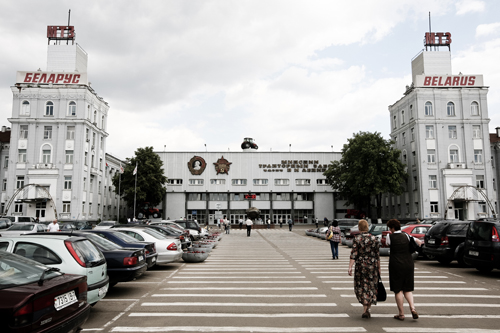
- The Minsk Tractor Works employs thirty thousand workers at its eleven plants in Belarus. The company produces nearly 10 percent of all the world’s tractors.
At the end of June, when the sun was high in the sky and the harvest of wheat was brought in from the fields, I went to Belarus to see the Minsk Tractor Works. My friend Jason Motlagh was working on a story of his own, so we decided to join forces: he would do the photographs for my story and I would act as an interpreter for his. Knowing Lukashenko’s attitude towards journalists, we entered the country as tourists.
Getting to the Minsk Tractor Works was easy. It was like finding our way to the Empire State Building in New York City or St. Peter’s in Rome. All roads in Minsk lead to MTW. If you can’t read the Cyrillic street signs, ask any stranger for directions, or just say the magic word “tractor,” and the furrowed brows will ease in recognition. Yes, yes, of course, take the Auto Factory metro line and get off on Tractor Factory station. It’s that simple.
As we ascended the station stairs, the view opened up, gradually, cinematically, until we found ourselves standing in front of a grand grey building that looked like a medieval castle with turrets on each side. Minskyi Tractornyi Zavod / V. I. Lenin said the giant letters on the façade and next to them, proudly displayed like military decorations on a general’s breast, were the oversize replicas of two Soviet medals awarded to the factory long ago, the Order of Lenin and the Order of the October Revolution, restored and burnished to a sheen. Right on the roof, on a rotating platform on the main building, instead of a red star, instead of a cross, instead of a golden calf, a full-size Belarus tractor surveyed the land, its stern headlights watching.
We didn’t pass the factory threshold. A pair of PR flaks came out to meet us—MTW had extended me a preliminary invitation over the phone—but within a couple of minutes I began to realize that Jason and I were not exactly welcome. “We’ll need to talk to the security services first,” said Ruslan Alexandrovich, an Arian type in his early thirties, eyeing us suspiciously. I guess that two foreigners with bushy beards, notepads, and cameras did not inspire trust in the neo-Soviet imagination, where the only bearded men were Chechen terrorists, dissidents, and parodists of Marx and Engels. “We’ll look into your request,” he added. “Call us back tomorrow.”
PHONE CONVERSATION 1
“Ruslan Alexandrovich,” I began cheerfully. “This is Dimiter Kenarov, the journalist from Bulgaria.”
Playing the Slavic card was always useful around here. I hoped to stir up memories of cucumbers and Black Sea resorts.
“Yes,” Ruslan Alexandrovich answered coldly. He was too young to recall the old wisdom of Soviet tourists: The hen is not a bird and Bulgaria is not abroad.
“Would it be possible for me and my photographer to visit the tractor factory?”
“You see, you need clearance from the security services and the security services need clearance from the factory director.”
“But I sent an official letter to the director and he forwarded it to the advertising department because you deal with the press.”
“Yes,” he paused, “but the director has to approve your visit.”
“Can’t you call him to ask for his permission?”
“No, no. You can’t just call the director like that. I don’t have the necessary clearance. It’s like calling the president of Belarus.”
“But his phone number is online. Any person could call the director.”
“Well then, why don’t you call him?”
“I did—and he told me to call you.”
PHONE CONVERSATION 2
“Hello, Mr. Petuhov. This is Dimiter Kenarov, the journalist from Bulgaria.”
“Yes, I remember.” Petuhov was the head of the advertising department. His voice was sleepy.
“Yesterday I spoke to your colleague. He told me that the director needs to approve my visit.”
“That’s right.”
“I sent the director an official letter and he forwarded it to you.”
“Yes, I have it here with me. He wrote ‘for your information’ on the letter.”
“That means you are the one to make the decision.”
“But he didn’t approve it explicitly. He only wrote ‘for your information.’”
“Isn’t this what bosses do? They forward such requests to the advertising department, so you can take the necessary steps.”
“He only wrote ‘for your information.’”
“So can I visit the factory? When I called you a few weeks ago you told me I could come over.”
“Look, the truth is we’re having some legal problems with our American partners.”
“I’d like to write an article about the Belarus tractor industry, not political issues.”
“Oh, no, we are not interested in politics either. We’re only interested in business.”
“So can I visit the factory then?”
“The director wrote ‘for your information’ on the letter. He hasn’t approved your visit yet.”
“Can’t you call the director?”
“I’m going on a vacation next week.”
PHONE CONVERSATION 3
“Hello, could I speak with the director of the factory, Mr. Puhovoy?”
“He’s not at the office and won’t be here today,” said his secretary.
“Can I call back tomorrow?”
“Tomorrow he’ll be traveling to other tractor factories.”
“Could you give me his cell phone number? I’m a journalist from Bulgaria, writing about the tractor industry.”
“I’m not allowed to give you his cell, but you could perhaps call the head of social development and ideological work. Do you want me to give you his number?”
Still hoping to get a foot in the door Jason and I decided to stick around Minsk. In the meantime, we tried all the limited forms of city entertainment. We rented bicycles (manufactured in the local bicycle factory) and rode around Gorky Park and the inhumanly-clean boulevards, walled by Stalinist architecture. We went to the renowned Minsk circus, where the clowns performed a vaguely political allegory which ended in the shooting of the evil circus director. We interviewed a dissident economist with a chipped tooth and a ponytail, who proceeded to gulp down four pints of the most expensive beer on the menu and shout against the economic bubble of Belarus. We became unwilling spectators of the “Physical-Culture Holiday Dedicated to the Day of Independence of Republic of Belarus,” where spandexed boys wrestled each other in the middle of a green field, while ironmen lifted dumbbells to disco beats. We even stumbled upon a demonstration at the main square, where lone youngsters expressed their dislike of Lukashenko by clapping. We did, it seems, everything possible in the Hero City of Minsk, except visit the tractor factory.
Finally we resolved to try a different approach. I had found a tractor factory in the town of Mozyr (a hundred kilometers from Chernobyl), which was part of the production association of the Minsk Tractor Works. If I couldn’t get in through the front door, perhaps I could sneak in the back.
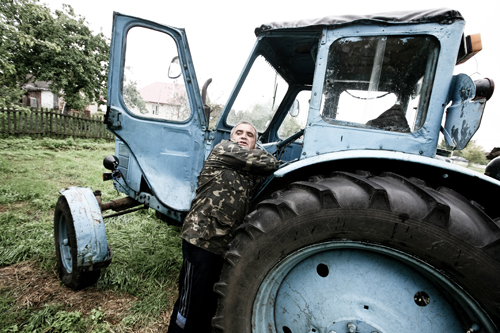
- Anatoly Kenanovich starts up his ’60s-era Belarus MTZ-50. “It’s a sturdy machine,” he says, “the best tractor in the world.”
Tractor—the word itself, iron-cast and earth-encrusted, conjures up the vast steppes of the Soviet Union. It was British and American inventors and investors who put the first tractors into production—massive 30,000-pound steam monsters in the late nineteenth century followed by much leaner models with internal combustion in the early twentieth— but it was the Soviets who made the tractor truly famous. Wherever you look in the history and culture of the USSR, there it is—the iron horse of Communism, the icon and fetish of the proletarian empire. Neither balalaikas nor Sputnik capture the genius of the place as perfectly as the tractor.
Take Alexander Dovzhenko’s celebrated 1930 movie Earth, revolving around the struggle between the old class of rich landowners, the kulaks, and the masses of the peasantry. The whole village commune is awaiting the arrival of a new tractor, which would give a boost to the collective farm and break the back of private ownership. The air sparkles with tension. Where is the tractor? Men and women and children have climbed up on the thatched roofs of their log cabins, surveying the road in the distance. Even the cows, pulling their primitive plows, look on in bovine anticipation. At that instant the camera suddenly shifts to the common object of desire. “It’s coming!” someone yells. “It’s here!” The jubilant crowd rushes forward to welcome the machine, which will soon enter as triumphantly as the Messiah in Jerusalem. Their joy is premature. The radiator has run dry and there’s no water around. What is to be done? Everyone’s spirit has sunk, the collectivization project is about to collapse, when one of the peasants comes up with a brilliant idea: all men unzip their pants and, bladder by bladder, fill up the radiator. Water or piss, progress must prevail.
Apart from tractor modernism (art about the people, but not exactly by the people or for the people), there were plenty of tractor-inspired musical comedies, which made a subset of socialist realism, characterized as “boy meets girl meets tractor.” By far the most popular was the 1939 Tractor Drivers by the director Ivan Pyryev (featuring the classic song “Three Tank Drivers, Three Merry Fellows”). Set in a fairy-tale universe with no direct reference to the awful famines, gulags, and purges that were killing millions at the time, it tells the story of a veteran tanker who travels to one of Ukraine’s collective farms, where he falls in love with the ablest female tractorist but wins her heart only after he proves his own skill as a mechanic on a Stalinets-S65.
Most of these productions were light entertainment and propaganda, but that did not stop tractor drivers from becoming the true heroes of the Soviet Union. The most prominent and beloved celebrity in the early 1930s (apart from Stalin) was not a movie star or an athlete or a politician, but a female tractorist named Praskovya (Pasha) Angelina, who was glorified by the government and the media for being an exemplary udarnik—shock worker—and the leader of an all-female tractor team, which purportedly achieved 129 percent of its plowing quota. She was everywhere at the time: on radio, on propaganda posters, in documentaries. A Soviet female worker par excellence, she even invented her own slogan: “One hundred thousand female friends—on the tractors!” Pasha Angelina was twice awarded a Hero of Socialist Labor, the Stalin Prize, three Orders of Lenin, and the Order of the Red Banner of Labor— before she died of cirrhosis in a Moscow hospital. “Her achievement and style,” writes the late historian of Soviet culture Richard Stites, “provided the lexicon of the Stalinist success story: peasant simplicity, toughness, a struggle against all odds (including sabotage), a production promise to Stalin, triumph on the furrow front, and the climactic journey to the Kremlin (in an olive-colored Lincoln!) to be received by the Great Leader.”
Pasha Angelina, the tractor paragon, was perhaps the most striking example of the complete merger of driver and machine to a point where the two became a diesel-driven centaur galloping toward the Manifest Destiny of Communism. The idealization of the machine in the Soviet Union was so powerful at the time that it bordered on idolization, a state-sanctioned worship of nuts and bolts. One publishing house put out a set of thirty-two volumes of tractorist autobiographies—thirty-two!—under the collective title People of the Stalin Tractor Works. While the West, wary of its own brutal history of industrialization, was becoming disenchanted with the effects of automated systems, and dystopian visions like Lang’s Metropolis and Chaplin’s Modern Times were springing up like mushrooms, the Soviets were engaged in a fullscale mechanization of the human being. The theory of “biomechanics” was as popular in the factories as it was in the theater. Though the revolutionary modernism of the 1920s was supplanted by the dimwitted dogmas of socialist realism of the 1930s, the cult of the machine never really disappeared from the Soviet imagination. To build the great Communist, future citizens had to renounce their private selves and become a class of homo tracturus: plowing through the fields of life, never turning, never thinking. Ironically, that system seemed to have more affinities with the scientific management of Frederick Taylor and Henry Ford than with Marx’s critique of the strife between workman and machine.
Indeed, as luck would have it, most of the iconic Soviet tractors celebrated in movies and books were made by Mr. Ford. Between 1921 and 1927 the government purchased over 25,000 Fordsons—the first mass-produced, affordable tractor, which had come out to great fanfare in the US in 1917. By 1924, the Fordson-Putilovets tractors were put on the assembly line in Leningard’s Red Putilovets plant (whose workers, incidentally, sparked the February revolution of 1917), and the USSR became the biggest international customer of the Ford Motor Company.
Every so often we’d see a tractor—a few posh, gleaming machines on the large farms, but mostly late models painted the customary red or blue. I’d shout out “Belarus” each time I saw one. My sanity was getting clouded by desperation.
The same was true of other tractor enterprises like those in Stalingrad, Kharkov, and Chelyabinsk. The Stalin Tractor Works, for example, the largest in Europe at the time, was designed and manufactured in the United States and then shipped and put together in Stalingrad by 570 Americans and fifty Germans. Its first product was International Harvester’s 15/30 model. As the economist Antony Sutton claimed, in his highly controversial study Western Technology and Soviet Economic Development, “Soviet economic development for 1917–1930 was essentially dependent on Western technological aid” and “at least 95 percent of the industrial structure received this assistance.” The problem, for Sutton, was that these “tractor” plants assembled in secret large numbers of tanks and armored-vehicles for the Red Army, and thus US corporations were largely responsible for creating the weapons industry of America’s bitterest rival.
“Today a tractor driver on the flanks, tomorrow driving army tanks,” said a Soviet proverb. For all the glorification of the agricultural tractor and its peaceful heart, there is no escaping the strange feeling that one is always looking at something slightly sinister and dangerous.
For two days Jason and I drove across the mind-numbing flatness of Belarus—fields and forests, forests and fields—on nearly empty roads that never seemed to turn anywhere and stretched to a dot beyond the horizon, like a policy speech by Lukashenko. We’d stop to eat in small provincial towns in gloomy restaurants next to the requisite statue of gramps Lenin sternly presiding over the main square. It was raining most of the time, not a hard rain, but an intermittent drizzle that drove you crazy if you decided to tinker with the wiper speeds. The sterile grandeur of Minsk, polished for showcasing, was replaced by hunched villages of moldy wooden houses, their once bright colors flaking off. Men and women walked listlessly down the streets or rode ancient bicycles, trying to avoid running over chickens and geese. Scrawny kids with their grandparents sold wild berries by the side of the road. This was the Belarus they don’t show on TV.
Every so often we’d see a tractor—a few posh, gleaming machines on the large farms, but mostly late models painted the customary red or blue (aesthetic variety, I found out, was not the industry’s strongest side). I’d shout out “Belarus” each time I saw one. My sanity was getting clouded by desperation.
As we were entering the town of Hancavicy, we spotted a blue Belarus, parked among the tall grasses in the yard of a house. If I could trust my eyes, it was the same one I had ridden as a child, the exact same color.
“Let’s go to that house,” I said, “and talk to the owner of the tractor.”
The house was a wobbly, wooden affair with a wide green stripe running horizontally across the façade, one of those cellars of serfs you might read about in Dostoyevsky. There were two junk cars in the yard, an old Lada and a Peugeot, their tires flat, the interiors busted. A couple of raggedly-dressed kids were playing in the yard amid garbage and broken furniture.
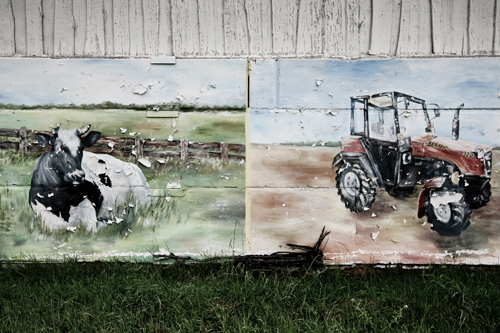
- Tributes to tractors—to their builders, to their drivers, to the machines themselves—are everywhere in Belarus. The government once published autobiographies of factory workers and produced propaganda films about collective farms.
Anatoly Kenanovich, lord of the house and father of the kids, came out to meet us. In his early fifties, stout, with grizzled short hair and missing teeth, he had the stamp of time all over his face. Wearing a pair of old pants and a fatigue jacket, soiled from overuse, he could have come straight from the 1930s—one of those goodnatured peasants, patriotic, rooted in the earth, who would have plowed a million acres each year for the glory of the motherland. Jason and I introduced ourselves. He showed no surprise when I told him I was doing a story on tractors.
“My tractor is an MTZ-50,” he began with a note of pride. “It’s about forty-five years old, but my father bought it twenty years ago and it’s been in the family since. It’s a sturdy machine, the best tractor in the world,” he said.
“When I was a kid,” I spurted, “I rode the same tractor in my village in Bulgaria.”
“Didn’t Bulgaria produce cucumbers? Very good cucumbers, I remember.”
After all the misfortunes, it seemed that the stars were starting to align.
“Do you think you could give us a ride on the tractor?” I asked.
We all walked in the backyard, followed closely by Anatoly’s kids, their eyes burning with curiosity. Two strangers, speaking a funny language to each other, asking questions about their father’s tractor; no one at school would believe this.
But I had my own childhood in front of me: a blue Belarus, with large rear wheels, the tractor of uncle Mitko—bless his soul. If my whole trip turned out to be a disaster, I thought that this one day would redeem it all.
While unhitching the flatbed trailer from the tractor, Anatoly talked about his life. He was born in the area and never traveled beyond Belarus. A couple of times he visited Minsk, but that was all. His wife worked at the local hospital and they had five kids together. Times were hard, the economy was going to the dogs, but they managed; he and his father used to have ten acres of land, but they sold most of it and now Anatoly worked as a field hand at a big collective farm nearby. Ten days he would be away, and then come back to his family for a while. It was better during the Soviet Union and … well, he didn’t wish to complain. He had two cows and a couple of pigs. He had his tractor. He wasn’t dependent on anybody for his food. If he were richer, he’d have to buy everything at once, fix the whole house, get a TV, but now it all happened in stages, which was generally a better way to live.
Anatoly climbed the small ladder into the cab and I followed him. Everything inside the MTZ-50 was just as I remembered it: the levers and dashboard instruments, the enormous wheel, the chipped blue paint. Even the smell was familiar: diesel and earth and sweat.
“I would have taken you out into the fields so we could load some hay,” he said, “but the weather is rainy, so we’ll just have to drive down the road a bit.”
He shifted into first gear and the tractor jumped forward. What would you call that? My Rosebud, my madeleine? I was there, a boy flying in a Belarus tractor, mindless of loss and death, unconcerned with the ego and its outrageous demands, lording over the large wheels and small wheels, riding time itself, backwards, toward the bright paradise of the past. The engine noise was deafening and we couldn’t talk, but that was all right for it would have taken me a lot of effort to explain how this tractor was in reality a time machine.
Losing your passport in a foreign country is never a pleasant experience; losing your passport in a dictatorship, where you’re working as a journalist on a tourist visa, is like one of those stock situations in Looney Tunes, when Bugs Bunny cross-dresses to fool his enemies, only to have his costume fall apart at the worst possible moment. When I reached into my pocket, back on the road to Mozyr and realized my passport was missing, I knew I was in trouble—all right, deep shit—but I tried not to panic. I decided to return to the safety of the Bulgarian embassy in Minsk, where I could be issued a temporary passport.
There was only one more thing to do first. The management of the Mozyr Machine-Building Plant (MMP) had agreed on the phone to my visit and I had no intention of missing the opportunity, passport or no. I still had my Bulgarian ID card, as well as my driver’s license, and I thought that that should be enough to get me through security. The way events were unfolding, I only half expected to get into the factory anyway, so I closed my eyes and crossed myself in the Christian Orthodox way.
When Jason and I walked through the main gate of the MMP the next morning, the first thing we saw was the statue of Lenin in the courtyard—not the colossus we had come across at town squares, not a life-size version either, but something in between, an idol that the factory workers wouldn’t be spooked by and yet could aspire to, a Lenin on steroids. He was painted metallic gray and stood, machinelike, in a classic pose: right hand in the pocket of his pants, left hand holding his proletarian flat cap, his mouth getting ready to burst into rhetoric. The sign behind him proclaimed: WORKERS IN SUPPORT OF ENGINEERING THOUGHT.
The director of the plant, Sergey Bychkovsky, a thirty-five-year-old bureaucrat with slightly crossed blue eyes and a striped blue shirt, met us in a conference room. It took him a few seconds to realize he had made a huge mistake in welcoming us—and for me to figure out that we should have shaved off our beards. He glanced uneasily at Jason’s huge Canon camera and the voice recorder dangling on my chest. He heard us speaking English. A red light, I could sense, was flashing in his mind.
The conversation was torturous. He unwillingly mumbled some figures. The factory currently employed 1,016 workers. Between 10 and 15 percent of the production was exported to Kazakhstan, but their main foreign market was the Russian Federation. The profit margins were getting better with each year. They had recently started manufacturing crawler tractors Belarus 1502, but it was still just an experiment, with only a few hundred machines produced so far. Hopefully, some day they could expand into the thousands.
“Could you perhaps give us a short tour of the factory?” I asked.
Bychkovsky stared at me like a bull, his suspicion growing by the minute, but still uncertain whether or not he should throw us out.
“Okay,” he finally said. “The head of marketing will give you short tour. But you can’t take any pictures.”
Jason tried to protest, but the director wouldn’t budge. No photographs without the permission of the ministry of industry, period.
The marketing head, a short balding guy with a fake gold watch, came in and told us to follow him. We walked across a little grassy patch towards one of the production hangars and passed on the way a long row of bulletin boards with the portraits of shock workers. I remembered the thirty-two-volume People of the Stalin Tractor Works. In the 1930s these workers would have been superstars. “They are our best employees,” our guide said. “The most productive ones.”
Vladimir Dolinsky, the marketing head, was forty-seven and had spent the last 26 years at the Mozyr Machine-Building Plant. His wife and daughter also worked at the factory, and his parents had retired from it. I found the idea of a multi-generational tractor-manufacturing family fascinating and tried to nudge him for more details, but he was hesitant to speak—I suppose following instructions from his boss— and walked hurriedly ahead.
“Were you here during the Chernobyl disaster?” I asked him, trying to change the topic. Mozyr and the surrounding area had received some of the heaviest radioactive fallout in 1986.
“Yes,” he answered and his face turned somber. “We sent our daughter away for a few months, but I continued working here. The factory remained open.”
So manufacturing didn’t stop during the crisis. I had heard that radioactivity sticks to metal like a magnet and the idea that a machinebuilding plant would keep its operations going after a big nuclear disaster seemed surreal, even by Soviet standards. Are there today hundreds of radioactive tractors plowing the lands of the former Eastern Bloc, I wanted to ask him, but then decided it’d be better to keep my mouth shut.
Dolinsky took us to the hangar where the final assembly of the Belarus 1502 happened. It was not exactly abuzz with work. A few engines, a few tracked chassis, a few cabs. There were about five or six workers and the place was oddly silent for a factory floor, our steps echoing in the cavernous space. The director’s spiel about rising profit margins—and Lukashenko’s boast of a thriving economy—seemed at that moment like a lot of hot air.
“And that’s the place,” Dolinsky said, like a magician who has just pulled a rabbit out of a hat.
That was it? That was what I had come all the way from Bulgaria for?
Back in the administrative building Dolinsky brought us the good news that he could arrange for a few machines and workers to come outside of the factory, so Jason could photograph them. While he was out taking care of the details, we had to wait in a cramped room: cheap wood paneling, boxy furniture, cable radio, and a gargantuan map of the USSR.
“I’d like to travel to Magadan one day,” Jason said as he was inspecting the map. Magadan, a port town on the Sea of Okhotsk, was once the gateway to the Kolyma gulag system.
“I’d like to travel up the Lena River,” I said. Vladimir Ilyich Ulyanov had taken his nom de guerre, Lenin, from the name of that river.
After a couple of minutes, Dolinsky returned and informed us that everything was ready. He escorted us to the gate of MMP, where another man, who was to act as our guide, took us to a field by the side of the plant and then vanished.
We were standing on a patch of dirt under enormous power lines. Two babushkas were chatting nearby. There was a railroad in the distance and beyond it a few of those horrendous brezhnevki, the concrete apartment buildings from the time of Leonid Brezhnev. Somewhere out there large megaphones were delivering a message, but all I could hear were the first echoing words “Attention! Attention!” We might as well have been taken to a nuclear testing site.
They showed up five minutes later: two policemen.
“Immigration police,” one of them said. “Your documents, please!”
It was a setup.
The Mozyr Police Department was full of people, but we didn’t have to wait in line. We were whisked to a separate room with a small desk and three chairs. We were offered cookies and very good coffee. It seemed that Jason and I were special guests.
Vadim Nikolaevich, a stocky twenty-six-year old cop with a clean-shaven face and a buzz cut, was keeping us entertained while phone conversations and faxes were flying back and forth between the authorities of Mozyr and Minsk. He liked to fish, I found out; he played the guitar (which he loved) and the accordion (which he was not crazy about); he wasn’t married; he was into powerlifting and arm wrestling. “Why isn’t arm wrestling an Olympic sport?” he asked in frustration. “It’s so much better than curling. Why is curling an Olympic sport?” Jason and I nodded in agreement. Then we all went out in front of the police department to have a smoke.
They had checked with the border police, and the database showed that I had entered Belarus on a valid passport and visa. A lost passport wasn’t a problem, really, especially when I had my ID and driver’s license. I was told I would be issued a special document that would allow me to travel to the Bulgarian embassy in Minsk. That was all very simple. There was only one minor issue left to resolve: tractors. Why did we go to the tractor factory? How did we end up in there? Why had we been working as journalists on tourist visas?
Vadim sat down with me at the desk to write an official report. Although it was already the end of June, a desk calendar was left open on April 26 and 27. “Anniversary of the Chernobyl Tragedy” read the small font under the first date. The second date featured a daily quote by Harry Truman, in Russian: “It’s a recession when your neighbor loses his job; it’s a depression when you lose your own.”
“Let’s start with the essentials,” Vadim said. “Tell me about your job.”
There was no need to hide our adventures anymore. The people at the Mozyr Machine- Building Plant, maybe the director himself, had called the police and handed us over, two bearded foreign journalists interested in Belarus tractors. I couldn’t invent a plausible lie, even if I wanted to. Yes, I was hoping to write an article about tractors. Jason was a photographer. I had a verbal invitation from the Minsk Tractor Works, but they reneged on it. We stayed for a couple of days in Minsk, where we rode bicycles, went to the circus, and visited a few churches. (See, we were tourists!) In my desperate desire for a story, I decided to contact the Mozyr subsidiary of MTW. We rented a car. My passport disappeared during the trip, and I had no idea how or who took it. I planned to go back to Minsk that same day to get a temporary one, but was arrested in the meantime.
The report took four pages in Vadim’s meticulous handwriting and when he read it over to us in all seriousness, I thought it was the most outlandish story in the world, yet everything in there was true.
Hours passed, but nobody told us we were free to go. Urgent faxes kept on coming from Minsk. Dark was falling outside and the faces around the police department were getting gloomier. Even Vadim became less talkative. I recalled my mother’s words, when she had just learned I was going to Belarus on a tourist visa: “You’re underestimating the power of dictatorships. You’re joking about it, but you’ll be sorry.” She had spent most of her life under Communism in Bulgaria and perhaps knew better.
It was already evening when three burly men entered the police department. An interpreter had been summoned for Jason, a young pregnant woman who worked as an English teacher, and I was taken into another room. The prisoner’s dilemma was about to begin. The Belarusian KGB wanted to interrogate us.
I had always wondered what KGB agents looked like.
The agent who interrogated me looked, to my bemusement and horror, just like KGB agents in the old Bond movies (the Western imagination was not so out of touch after all). He was heavyset and boxy, like a wardrobe or a very large trunk, with a crew cut and a dark suit. When I entered the room, he was sitting behind a desk, twirling a pen.
“Good evening,” he said, looking somewhere past me.
Other people filed into the room: a few policemen from the Mozyr Police Department and another KGB agent with a video camera. (The third one was with Jason and the pregnant interpreter.) All of them remained standing, like a cocktail crowd about to listen to a piano recital.
“So tell me about your work,” the man behind the desk, who introduced himself as Piotr Simeonovich, said in a calm tone. He was wearing a huge wristwatch with what looked like the KGB coat of arms on the dial.
I laid out the gist of my story.
“You say you are a writer, but anybody could be a writer. I could say I’m a writer,” he said, still twirling the pen. “Imagine if I came to your country as a tourist and started going to factories.”
I explained how I was doing a story for a US magazine called the Virginia Quarterly Review, where I had published before (they could check on the Web), how the magazine was preparing a special issue for the twentieth anniversary of the collapse of the Soviet Union.
“Collapse? What does it mean—collapse? The Soviet Union did so many great things. They liberated Bulgaria from the Nazis. Before that the Russians liberated you from the Turks. We are all Slavs, one blood.”
“I didn’t come here to write about politics.”
“But you mentioned collapse. Why do people say that? It was very sad when the Soviet Union fell apart. We were all ready in 1991 to fight to defend it, but the traitor Gorbachev dissolved it and then reported to Bush.”
A lot of people in Bulgaria, I told him, also felt nostalgic for the old times.
“Well, we preserved the old times in Belarus. When I go to the store, I still buy the food brands that were popular in the Soviet Union. True, people here are not as rich as in some other countries, but they live in safety and stability.”
“Look,” I said, “I don’t want to argue with you about that. I’m a writer, not a politician. I majored in literature in college, American and Russian poetry. You know, Anna Akhmatova, Joseph Brodsky.”
“Anna Akhmatova. She has a lot to thank Stalin for. I don’t like her poetry very much. It’s— how should I say?—a bit too convoluted and complicated for me. I prefer simpler poems.”
I wasn’t in the mood for debating poetry with a KGB agent, so I kept quiet.
“We have good newspapers here as well,” he continued. “Would you like to work for our newspapers? You can stay in Belarus and we’ll find you a beautiful Belarusian girl.”
The audience in the room started to chuckle.
“Look,” I started again, seeing that there was humor and good will around. “I’m sorry I came on a tourist visa. I had the best of intentions, but the worst luck.”
“We see that,” said the other KGB agent, finally cracking a smile. “Good intentions, but no luck.”
“We’ll still need to verify your identity,” Piotr Simeonovich said. “And we’ll keep you in jail until we find out who you are.”
On his way out, Piotr Simeonovich came up to me. “There is this story you should hear,” he said and proceeded to narrate a parable about a king and his servant, who was responsible for loading the king’s gun. The servant was in the habit of saying “It’s all good.” Once the gun went off by mistake and cut off the king’s thumb. “It’s all good,” the servant said. “No, nothing is good,” the king answered and jailed him. He got another man to load his gun, but during a hunt the whole party was captured by cannibals. They killed everyone, but the king survived because of a superstition among the cannibals that people with a missing body part shouldn’t be eaten. The king returned home and freed his servant. “You know,” the king told him, “you were right about the thumb. It was all good. Forgive me for jailing you.” But the servant answered: “It’s all good. If you hadn’t jailed me, I would have joined you on the hunt and would be dead now.”
“So maybe you should be thankful that we’re jailing you,” Piotr Simeonovich said. “It’s all for the best.”
It was the most elaborate death threat I had ever received.
My jail cell was number 11, and I was its only inhabitant. It was about 3.5 meters long and 1.3 meters wide. I know because I had plenty of time for measurements. There was an iron bunk bed, a cold water faucet, and a squat toilet. The walls (3.2 meters high) were painted a deep psychedelic green and part of the floor was made out of reddish boards—the two colors of the Belarusian national flag.
It was insufferably clean, like everything else in the country. I had never been to a jail before, but I had read some Solzhenitsyn and had imagined these things differently—dank and cold places, smelling of mold and human feces, places where you contracted tuberculosis or typhoid. In my cell, there was even an air vent by the ceiling sucking in the cigarette smoke. In some ways it was better than my hotel room in Minsk. The only filthy area was the ledge of the barred window, where previous jailbirds had stubbed out their cigarette butts and thrown random garbage. There I found a creased scrap of newspaper with a crossword puzzle that somebody had failed to solve: port wine, bankruptcy, beer, machinations.
That ledge was my favorite place. I’d climb up on the top bunk and stare out of the window at a wall topped with razor wire. I had bought a pack of “Prima” filterless cigarettes as a curiosity (my hipster friends would have been jealous), but now I ended up smoking them all. The guards had graciously left me my notepad and pen, and I had earlier borrowed at random a book from the jail library (a wooden cabinet with a sticker “Knowledge Is Power”), which turned out to be a collection of novellas by the Soviet writer Alexander Mironov. The volume itself was a sad floppy affair with half of its pages missing. Probably somebody before me had been out of toilet paper. Most of the novellas were adventure tales in the socialist realism vein—fast-paced plots about the Soviet Union’s conquest of the Arctic Ocean, about brave captains of icebreakers, and sly German spies. “He didn’t feel like sleeping,” one of them opened. “Lying on the narrow cot, Seryoha was listening to the rhythmical breathing of the icebreaker. Over the steel board the water was hissing and gurgling. Seryoha propped himself up on an elbow, squinted in the porthole, and saw through the thick greenish glass a blue sea, spreading out into infinity.” Like Seryoha, I might as well have been locked up on an icebreaker plowing toward the Arctic. And weren’t icebreakers the tractors of the frozen seas?
Officially, my arrest warrant claimed that, “with the assistance of KGB operatives,” I was detained because of missing identification and my subsequent failure to immediately notify the authorities of the loss. There was no word about journalism on a tourist visa, nothing about visiting tractor factories; Lukashenko’s regime, hard-pressed by both the European Union and the United States, hard-pressed by the International Monetary Fund, did not want to draw attention to itself by appearing to prosecute foreign journalists. That is why Jason’s tourist visa was canceled the day after the interrogation, and he was quietly kicked out of the country. That is why I was jailed “for verification of my identity” and for nothing else. In a different time and situation, the KGB might have accused us of espionage. For, who knows, perhaps the Mozyr factory was producing tanks in secret.
All things considered, my stay in the Mozyr jail was not that bad. I slept more than I had ever slept in my life. The food—borscht, bread, one semi-raw meatball, and a bowl of oatmeal— was horrible, served in greasy plastic plates, so I didn’t mind that there was only one meal per day. I even built pyramids out of the extra bread. The guards were unusually kind to me: they would bring me tea and sugar, a new pack of cigarettes, even a bucket of hot water once. I bathed over the squat toilet, pouring water over myself with the tin cup I used for tea.
The only real inconvenience was the morning and evening inspections: the rattle of keys and bolts, the loud bang of jail doors. The sounds would grow louder and louder as the guards moved methodically along the cellblock, getting closer to my cell, and there was a lot of anxiety involved in the waiting. When my door opened, I would go out, face turned against the wall, and wait for one of the guards to rummage through my cell. He usually carried a sledgehammer, which he used to check for hollow spaces in the floor. After a few moments I would be allowed to go back in. The cell door would slam behind me, the keys turn, and the bolts slide violently back into place. The clatter of iron against iron would grow fainter, until the inspection was complete and the cellblock was quiet again.
But quiet was relative in the Mozyr jail. There were car thieves in the other cells, burglars, drunks, prostitutes, even murderers. Plus one Bulgarian journalist, who had lost his passport. “Release the Bulgarian, you satraps!” one of my neighbors would scream and rattle with a spoon on his door every time I was taken out for inspection. Another one would wail an off-key version of the popular Soviet song “Let there always be sun.” In the evenings the car thieves exchanged legal opinions across the barred windows on the correlation between car prices and prison terms. I wish I had met those brave souls in person.
I was just getting used to the routines of my jail life, when my temporary passport finally arrived from the Bulgarian embassy in Minsk. Five days after I was arrested, I was told to get ready to leave; I was to be deported out of the country in a police convoy. I was taken to the warden’s office, where I was given back my belongings. “Protect the Earth from Cigarette Smoke,” pleaded one of the office posters, two palms shielding a blue planet. The big electronic clock on the warden’s table was showing eight o’clock. The guards smiled at me and waved good-bye.
“I hope you’ll write nice things about us,” one of them said.
The citizen of Bulgaria, Kenarov Dimiter Plamenov, in interests of a public order is sent from territory of the Republic of Belarus for the duration of three years. The above citizen has to be removed from the territory of Belarus by the following flight …
I was handed this document by Vadim Nikolaevich, the young cop from the Mozyr Police Department, who was selected, along with another cop, to escort me to the Minsk airport in a special van. I felt somewhat proud that now I was officially a threat to public order in Belarus, banished from the country for three long years. Tractors were not to be tampered with.
“How was your stay in jail?” Vadim asked me on the way.
“It was okay,” I said. “I shouldn’t complain. I only wish the jail library were better. I ended up reading a lot of socialist realism.”
“Isn’t socialist realism what you came to Belarus for?” he laughed.
Vadim was right, of course. Tractors were just my excuse—or, rather, I was never interested so much in real tractors as in the idea of tractors, the way a whole country could pin its identity on a machine and function like one—plowing, sowing, moving slowly and confidently in a straight furrow and rarely making a turn. There was something both practical and vulgar in that, peaceful and benign yet also vaguely threatening in this steadfast refusal to veer off course. As history has taught us, the tractor is the flipside of the tank.
In front of the Minsk airport, right before I was put on a plane to my home in Bulgaria, I got one last glimpse of my Belarus: a police tractor, complete with red-and-blue flashing lights and a cop behind the wheel. It was there to tow away illegally parked vehicles.







